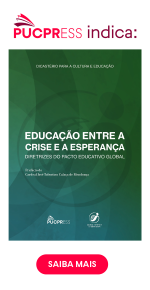Da espiritualidade enquanto experiência epistêmico-existencial envolvendo a verdade como paradoxo em Sören Kierkegaard, o sagrado em Rudolf Otto e a presença espiritual em Paul Tillich
DOI:
https://doi.org/10.7213/2175-1838.14.003.AO02Resumo
Segundo Kierkegaard, a verdade se sobrepõe ao caráter objetivo que encerra desde uma investigação histórica até um exercício especulativo, guardando correspondência com a subjetividade em um movimento que implica a condição-limite da interioridade. Detendo-se em tal princípio hermenêutico-existencial, o artigo assinala a espiritualidade enquanto experiência epistêmico-existencial envolvendo a verdade como paradoxo em Kierkegaard, que se sobrepõe à mediação lógico-discursiva e implica uma construção dialético-subjetiva que transcende a razão histórico-objetiva (ou finita). Dessa forma, caracterizando a espiritualidade enquanto experiência epistêmico-existencial que encerra como único tipo de evidência a evidência de caráter não racional, o artigo recorre à perspectiva fenomenológica de Rudolf Otto, que sublinha o sagrado e a sua distinção absoluta em relação à realidade natural e ao seu caráter perceptível em uma construção que enfatiza o elemento não racional e a sua natureza suprarracional e implica o numinoso, que escapa aos processos lógico-racionais e, emergindo como a priori, converge para a apreensão do racional e do não racional na noção da Divindade. Assim, se a relação com Deus se sobrepõe às fronteiras que encerram a subjetividade e a objetividade, convergindo para a superação do referido esquema estrutural epistêmico, o artigo, baseado na perspectiva teológico-filosófica de Paul Tillich, detém-se no conceito de Presença Espiritual que, caracterizando a vida sem ambiguidade, implica a união transcendente, correlacionando ágape e gnosis enquanto experiência epistêmico-existencial envolvendo a relação com o sagrado como presença de Deus através de um movimento extático-religioso que converge para a automanifestação, a autorrevelação e a autocomunicação do Absoluto e Transcendente como Deus.
Downloads
Métricas
Downloads
Publicado
Como Citar
Edição
Seção
Licença
O(s) autor(es) transfere(m), por meio de cessão, à EDITORA UNIVERSITÁRIA CHAMPAGNAT, pessoa jurídica de direito privado, inscrita no CNPJ/MF sob o n.º 76.659.820/0009-09, estabelecida na Rua Imaculada Conceição, n.º 1155, Prado Velho, CEP 80.215-901, na cidade de Curitiba/PR, os direitos abaixo especificados e se compromete a cumprir o que segue:
- Os autores afirmam que a obra/material é de sua autoria e assumem integral responsabilidade diante de terceiros, quer de natureza moral ou patrimonial, em razão de seu conteúdo, declarando, desde já, que a obra/material a ser entregue é original e não infringe quaisquer direitos de propriedade intelectual de terceiros.
- Os autores concordam em ceder de forma plena, total e definitiva os direitos patrimoniais da obra/material à EDITORA UNIVERSITÁRIA CHAMPAGNAT, a título gratuito e em caráter de exclusividade.
- A CESSIONÁRIA empregará a obra/material da forma como melhor lhe convier, de forma impressa e/ou on line, inclusive no site do periódico da EDITORA UNIVERSITÁRIA CHAMPAGNAT, podendo utilizar, fruir e dispor do mesmo, no todo ou em parte, para:
- Autorizar sua utilização por terceiros, como parte integrante de outras obras.
- Editar, gravar e imprimir, quantas vezes forem necessárias.
- Reproduzir em quantidades que julgar necessária, de forma tangível e intangível.
- Adaptar, modificar, condensar, resumir, reduzir, compilar, ampliar, alterar, mixar com outros conteúdos, incluir imagens, gráficos, objetos digitais, infográficos e hyperlinks, ilustrar, diagramar, fracionar, atualizar e realizar quaisquer outras transformações, sendo necessária a participação ou autorização expressa dos autores.
- Traduzir para qualquer idioma.
- Incluir em fonograma ou produção audiovisual.
- Distribuir.
- Distribuir mediante cabo, fibra ótica, satélite, ondas ou qualquer outro sistema que permite ao usuário realizar a seleção da obra ou produção para recebê-la em tempo e lugar previamente determinados por quem formula a demanda e nos casos em que o acesso às obras ou produções se faça por qualquer sistema que importe em pagamento pelo usuário.
- Incluir e armazenar em banco de dados, físico, digital ou virtual, inclusive nuvem.
- Comunicar direta e/ou indiretamente ao público.
- Incluir em base de dados, arquivar em formato impresso, armazenar em computador, inclusive em sistema de nuvem, microfilmar e as demais formas de arquivamento do gênero;
- Comercializar, divulgar, veicular, publicar etc.
- Quaisquer outras modalidades de utilização existentes ou que venham a ser inventadas.
- Os autores concordam em conceder a cessão dos direitos da primeira publicação (ineditismo) à revista, licenciada sob a CREATIVE COMMONS ATTRIBUTION LICENSE, que permite o compartilhamento do trabalho com reconhecimento da autoria.
- Os autores autorizam a reprodução e a citação de seu trabalho em repositórios institucionais, página pessoal, trabalhos científicos, dentre outros, desde que a fonte seja citada.
- A presente cessão é válida para todo o território nacional e para o exterior.
- Este termo entra em vigor na data de sua assinatura e é firmado pelas partes em caráter irrevogável e irretratável, obrigando definitivamente as partes e seus sucessores a qualquer título.
- O não aceite do artigo, pela EDITORA UNIVERSITÁRIA CHAMPAGNAT, tornará automaticamente sem efeito a presente declaração.



